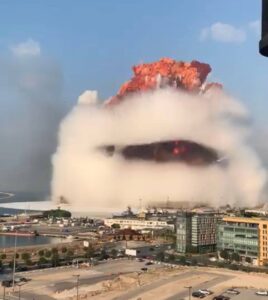
Beirut explosion highlights danger of Hezbollah’s guided munitions
In recent years Hezbollah has been acquiring precision-guided munitions which make the terrorist group’s arsenal of 150,000 missiles more dangerous. The massive explosion in Beirut that has affected hundreds of thousands of people, which injured thousands and likely killed hundreds, now reveals how dangerous precision guided weapons could be in the wrong hands.
This threat was made more serious by Hezbollah leader Hassan Nasrallah’s own comments in 2016 and 2017 when he threatened to target sensitive facilities in Israel where he claimed Israel stores gas or ammonium nitrate.
Hezbollah not only has sought to upgrade its rockets with precision guidance to target Israel’s critical infrastructure, but it has placed rocket launch sites in Beirut, according to recent reports. Hezbollah also has a special terminal at the Beirut Port where is regularly unloads weapons that are shipped to Lebanon from Iran, The Jerusalem Post has learned.
The containers with the weapons are unloaded by Hezbollah operatives and do not undergo customs inspections like regular cargo. The weapons are then stored for periods of time at the port before they are distributed to Hezbollah bases and storage centers across the country. The dangerous munitions, combined with Hezbollah’s threats to use precision guided missiles against Israel may not be linked to the tragic explosion in Beirut but they reveal the danger Hezbollah poses to Israel and how dangerous Hezbollah’s munitions can be to civilian areas.
In January, Jonathan Schanzer, senior vice-president for research at the Foundation for Defense of Democracies, wrote at Commentary wrote that in recent airstrikes in Syria Israel’s “targets are precision-guided munitions.” Iran has sought to supply Hezbollah with kits for these munitions. The munitions are abbreviated as PGMs. Iran is trying to find more clandestine ways to move the kits to Lebanon. Once in Hezbollah’s hands the kits, which include circuit boards, fins for rockets and software, can be assembled to integrate with Hezbollah’s arsenal.
The Israel Defense Forces last year revealed how the PGM project has progressed. Iran once tried to move whole missiles, with the guidance installed, via Syria. “Most of these efforts were prevented by attacks attributed to Israel.” Iran then tried to move the kits to Hezbollah and then to set up factories in Lebanon to convert rockets locally so as to not have to expose the kits and missiles in Syria on the way to Hezbollah. The IDF published photos of the alleged PMG factory sites in Lebanon in September 2019.
Uzi Rubin, founding director of Israel’s Missile Defense Organization, wrote in June at the Begin-Sadat Center for Strategic Studies, that the PGM threat need to be taken seriously. They can paralyze civilian and military infrastructure he notes. The weapons can win wars. “Israel should do everything in its power not only to prevent defeat by them but to use them to defeat its enemies.”
Once Hezbollah has these weapons it could launch an operation “firing salvoes of precision missiles to paralyze Israel’s air bases.” Rubin notes that Israel’s air defense, such as Iron Dome and David’s Sling, “will probably be able to destroy most incoming missiles, but not all of them.”
Nasrallah has boasted of the precision of Hezbollah’s missiles. According to foreign reports in February 2019 Hezbollah had attempted to receive GPS “suitcase kits” from Iran for upgrading its missile arsenal precision.
We also know that as far back as 2017 Ynet warned that Iran was using the Iran Deal to upgrade the precision of its rockets. These GPS-guided missiles were turning “dumb” rockets into precision munitions. Iran tested them against ISIS and then used them against Kurdish dissidents in 2018 and fired ballistic missiles at a US base in Iraq in January. It also sent ballistic missiles to Iraqi militias in 2018 and 2019.
According to the Alma Research Center in July Hezbollah has 28 launch sites for rockets in Beirut. The report notes that these sites include Fateh 110 missiles and that “these particular missiles are subject to Hezbollah’s missile precision project.” Launch sites are located in southern Beirut.
We need to understand the PGM threat and its links to the tragedy in Beirut as part of the same context. Hezbollah’s hijacking of Lebanon’s government helped cause the corruption, irresponsibility and non-accountability that led the government not to secure a warehouse full of dangerous ammonium nitrate. Hezbollah traffics in the same dangerous chemicals, even if it wasn’t linked to this warehouse. Hezbollah has hollowed out Lebanon to create smuggling networks, such that people are fearful to demand accountability regarding things like a warehouse full of explosive material.
Hezbollah has stockpiled weapons in other places in Beirut. It is building factories to transform rockets into precision munitions. It has threatened to use those rockets against Israeli infrastructure and Nasrallah has said in speeches he could target things like gas storage in Israel to harm civilians. That Hezbollah uses other warehouses to store weapons is known and that it uses them in civilian areas is also well known. Any attempt to challenge Hezbollah has been met with assassinations and threats in Lebanon.
That Lebanon can unload weapons via its own terminal at Beirut port shows how unregulated its transfer of dangerous weapons has become. Israel has warned about the PGM threat and Hezbollah’s destabilizing activities. The foreign reports and IDF report last year make clear how serious a threat these weapons and the network of corruption, state weakness and illicit storage, have become.
Source: JP





